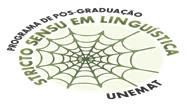Banca de QUALIFICAÇÃO: PRICILIANA DIAS PEREIRA
Uma banca de QUALIFICAÇÃO de MESTRADO foi cadastrada pelo programa.DISCENTE : PRICILIANA DIAS PEREIRA
DATA : 15/09/2022
HORA: 14:00
LOCAL: defesa remota
TÍTULO:
BORDER SCHOOL AND THE BOLIVIAN STUDENT SUBJECT: IDENTITY, SUBJECT, LANGUAGE AND TEACHINGPALAVRAS-CHAVES:
Border, School, Bolivian Student, Portuguese language, Literacy, identity.
PÁGINAS: 101
GRANDE ÁREA: Lingüística, Letras e Artes
ÁREA: Lingüística
SUBÁREA: Teoria e Análise Lingüística
RESUMO:
To talk about languages and education in the frontier school, through language studies we join the theory of Discourse Analysis which, through theoretical and methodological concepts, authorizes the analyst to include the ideological and historical conditions when the discourse was produced. This allows the analysis to go beyond the grammatical structure of the text/cutting, and makes it possible to understand how it produces and conveys meaning. Which leads us to present the historical context of the constitution of the Midwest Brazil-Bolivia border, and more precisely the constitution of the northwest border strip of the municipality of Pontes and Lacerda-Mt, with the objective of showing the heterogeneous linguistic definition that compose this border. . In the city of Pontes e Lacerda, state and municipal border schools receive students with dual nationality – Brazilian and Bolivian. In this course, we will approach the origin of Brazilian education, the promotion of educational policies for the immigrant student, specifically, the Bolivian student. In view of this, we will explain about the beginning of education in the municipality of Pontes e Lacerda-MT and the formation of border schools in Vila Matão and Comunidade Triunfo, which is approximately located about 60 km from the border of Bolivia. The border school is formed in a heterogeneous space and has a reality of pluralities, where it is necessary to reflect on the identity built and guided by the Brazilian education system. The border school, defined in its political pedagogical project, without considering linguistic diversities, making up part of its reality. In this sense, the identity of the frontier school is consolidated, while subjects and languages are silenced, the school is thus constituted as a place designed by the State, where the student subject must learn to write and speak the language of the country. , the official language of the State – the Portuguese language. The school starts to act as an ideological mechanism, used to work on pedagogical policies of interest to the State. When the Bolivian students arrive at our schools, they are already subjected in their mother tongue, Spanish, and all their linguistic knowledge is related to the social practices that they experienced outside the classroom and that, from the school learning process, will suffer other cultural interferences. , social and linguistic, that is, in the classroom Bolivian students must learn a new language while they need to follow the syllabus. At the same time, they are inhibited from using their mother tongue in the classroom. Thus, it establishes a tense relationship between subject and languages. In this sense, we focus on reflecting on the Portuguese language literacy process for Bolivian students in a mother tongue pedagogical profile. We observe discursive marks of the historical and ideological processes of language policies established in school pedagogical work.
MEMBROS DA BANCA:
Presidente - 73774008 - PAULO CESAR TAFARELLO
Interno - 592.690.301-72 - ROSIMAR REGINA RODRIGUES DE OLIVEIRA - UNEMAT
Externo ao Programa - 842.897.837-91 - MARLON LEAL RODRIGUES - UNEMAT



